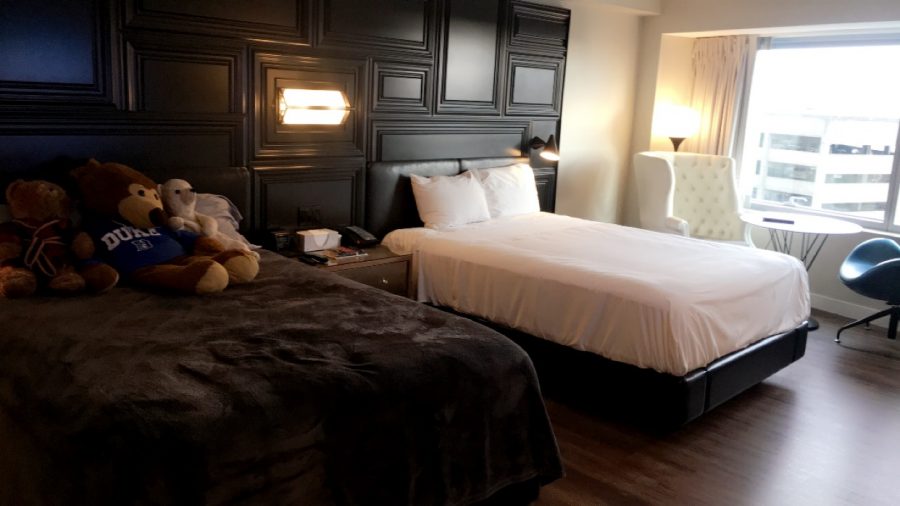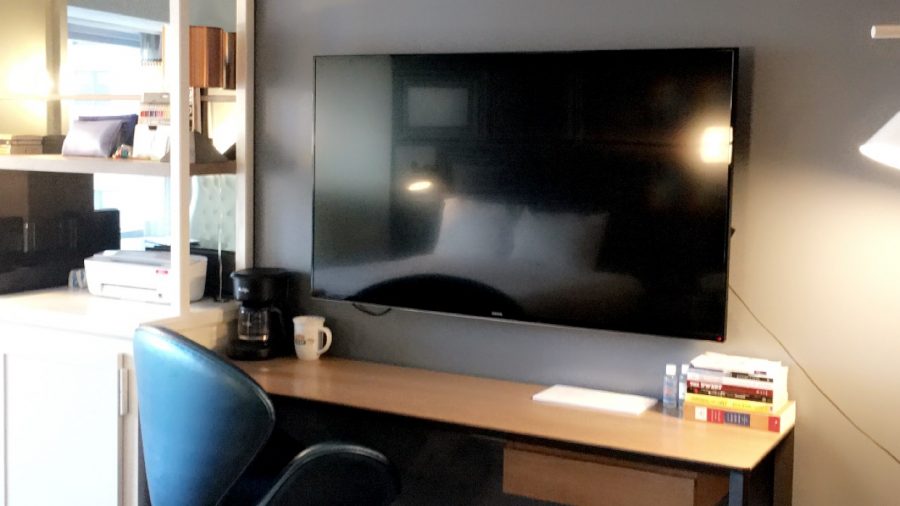Dorm life on Emerson’s vertical Boston campus is a far cry from traditional college housing. Here, students pack elevators to ascend to their four- to eight-person suites, sometimes nearly 20 stories from the ground. A few overlook the Boston Common or the crowded bustle of the Theater District. Rooms are relatively small and tucked close together.
But for 189 Emerson students, residence life has taken a turn to the upscale this semester. As part of Emerson’s effort to de-densify campus, those students have been shifted to the W, a four-star hotel a stone’s throw from campus.
The prestigious hotel houses Emerson students on floors five through 14 out of 26 floors, and the floors above are condos with permanent residents. Students sleep in king- and queen-size beds, are greeted by a doorman as they enter the hotel, and have access to a 24/7 fitness center. Some rooms have a painting of Edgar Allen Poe strung on the bathroom wall.
“I feel like I’m living in The Suite Life of Zack and Cody,” Raven Goldston, a third-year comedic arts major, said. “I get this whole fancy room to myself, and I can call for room service and all this while doing school.”
A shorter walk to campus than the trek from the Paramount Center, the W is just a quick stroll down Tremont Street towards the glass-walled building’s glowing purple LED “W” sign.
Goldston’s room, a single with a king bed, has a white egg-shaped chair in the corner, which she uses to attend Zoom classes. The table has become her desk, the mini-bar her kitchen. She has a flat-screen TV and a wardrobe the same size as the one typically provided in Emerson dorms. Her room doesn’t have a bath, but others do.
“It feels like my own studio apartment, and I really like that,” Goldston said.
The temporary deal that placed students in the W is a makeshift solution to housing where social distancing is easier to maintain. Other local institutions have turned to similar contracts with hotels—Northeastern University is currently housing students on eleven floors at The Westin, and Suffolk University has placed students in four downtown hotels.
While details of these contracts remain unknown to the public, it is clear that the relationships are mutually beneficial. Hotels, financially ravaged by the pandemic, are searching for reliable sources of income at a time of reduced travel, while universities are looking to outsource students from on-campus housing to reduce building capacities and adhere to COVID-19 safety guidelines.

The W was selected for this collaboration, Director of Housing and Residential Education Christie Anglade said, because it was the most feasible long-term option for the college.
“We considered a number of different options, but the W Boston was the most ready, willing, and able to support our students’ needs,” Anglade said. “It was the closest proximity to campus. It had the largest rooms that I felt could accommodate students living in them full time as opposed to rooms that are better for just an overnight stay, and they had a really high level of flexibility in what they were willing to do to help accommodate our students, such as installing the washers and dryers on each of the floors.”
If the college were to pay typical rates to reserve rooms, a contract with the W would cost the college about double what students pay in room and board charges by semester. This time of year, guests would generally pay upwards of $200 a night for a room, though in the era of COVID-19 rates are slightly reduced. Guests can still rent rooms on floors not occupied by students.
While many students relish residing in the W, some have encountered issues with resources usually easily afforded to other on-campus students. The college is still the one providing resources, like internet, to students. Emerson Information Technology staff installed the internet source prior to students moving in, but wi-fi at the hotel has been a consistent source of student complaints.
“The wi-fi sucks sometimes,” Mia Trubelja, a third-year performing arts major, said. “It’ll randomly start to have issues. I think it’s been improving over the weeks, but when we first started classes, I was having to set up a hot spot on my phone because that was more stable than the wi-fi here.”
Logan Steenbergen, a second-year visual and media arts major, had to explain his frequent technical difficulties to his professors.
“Zoom crashes a lot and is always a little slow,” Steenbergen said. “Sometimes it just doesn’t work. I’ve let my teachers know I live in the hotel. And if I glitch out, I’ll try and get back into the Zoom call, but the wi-fi is very sketchy.”
Some students have also said that the provided laundry facilities are not adequate for the number of students living at the W. Just one washer and dryer sit on every other floor, totaling six machines for the nearly 200-student population.
“The laundry situation is probably the biggest con about the W—we ended up getting laundry about a week after we arrived,” Goldston said. “Laundry currently takes me around nine hours to do. The W Hotel Facebook group we’re all a part of is just students saying, ‘Hey, take out your laundry.’”
Before students lodged complaints, the laundry room also doubled as the garbage room and had been filling up with students’ trash.
Jessica Ross, a fourth-year writing, literature and publishing major, said so much trash has accrued at times that it can be difficult to open the doors to the laundry machines.
“Trash was piling so high that on several floors you couldn’t even get to the dryer door without having to move other people’s trash out of the way,” she said. “I was in the elevator and someone was getting out on floor nine, and I just saw trash lined up outside the elevator.”

Ross said the state of the laundry rooms has improved since students initially moved in. Trash rooms are now on every floor, as opposed to every other floor.
“It’s much better than it was, but it’s still pretty gross,” Ross said. “I wish they had sanitizing wipes in the laundry rooms to even just wipe down the machines before people use them.”
The staff at the W have become a bright spot for student residents.
“The W staff are acting like we are guests,” Goldston said.”They’re holding open doors, saying good morning. They’re really making sure that our stay is comfortable. I think it’s a very smart business tactic because I would come back and stay at the W just based on the way we’re being treated.”
Cristina Flores, the resident director at the hotel, said she has also appreciated making connections with the W’s staff.
“Building partnerships with the hotel staff has been an amazing change,” Flores said. “It’s been great to have partners to work with and meet our shared goal of the students having a good time here. We keep each other up to date on any facilities problems that are happening or any pending problems.”
Flores was specifically chosen to be the designated RD for The W because she handled a similar housing transition while employed by Berklee College of Music in 2018. There, she was the residential director at the Sheraton Hotel on Dalton Street.
Goldston said she was considering staying home this semester due to concerns over virus transmission, but the announcement of an alternative living arrangement focused on reducing housing density changed her mind.
“Dorms can be very crowded,” Goldston said. “The shared spaces are especially difficult in Piano Row, which was my building of choice, because you’re living with five other people, and you have to account for the people those five people see and the people that those people see. It’s not like you can contain your life in such a small bubble living with people who are doing extracurriculars or involved in classes that may require them to interact closely with others, so at the W, I get to be separated from the crowds on the Emerson campus.”